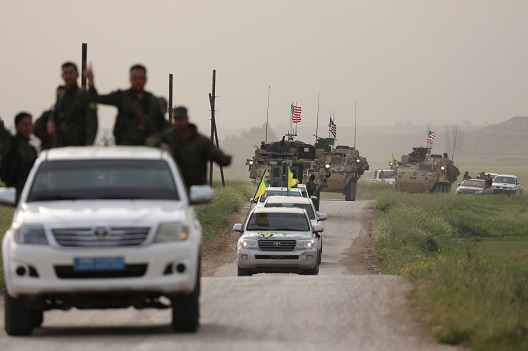 In his book entitled Barzani and the History of the Kurdish Liberation Movement, Masoud Barzani President of Iraqi Kurdistan, wrote that his father Mullah Mustafa once said: “We are willing to become the fifty-first American state if that is what it takes for our cause to succeed.” However, once the 1975 Algiers Agreement between Iran and Iraq was ratified with American’s blessing, the Mullah’s dream quickly faded. Kissinger later wrote in his book Years of Renewal that aid to the Kurds had amounted to “20 million USD and 1,250 tons of ammunition.”
In his book entitled Barzani and the History of the Kurdish Liberation Movement, Masoud Barzani President of Iraqi Kurdistan, wrote that his father Mullah Mustafa once said: “We are willing to become the fifty-first American state if that is what it takes for our cause to succeed.” However, once the 1975 Algiers Agreement between Iran and Iraq was ratified with American’s blessing, the Mullah’s dream quickly faded. Kissinger later wrote in his book Years of Renewal that aid to the Kurds had amounted to “20 million USD and 1,250 tons of ammunition.”
Kurds refer bitterly to the first American betrayal: American Abrams tanks entering the city of Kirkuk bearing the Oh Hussein banner, a flag carried by some Shiite militants. Kurds point to two factors that were decisive in bringing about this violent end to their ambition to create an independent state: the American stance, and divisions between the leading Kurdish forces. As they enter the city of Raqqa, Syrian Kurds are wondering if the Americans will abandon them too. Are Kurdish forces being used to confront ISIS, only to be left to the mercy of neighboring countries and the Syrian regime?
Saleh Muslim, the former president of the Democratic Union Party (PYD), told Masdar Souriya that the military alliance with the Americans was merely part of the international coalition to fight terrorism. He denied that American actions in the Kurdistan region amounted to “betrayal,” since there was no agreement in the first place. He attributed the matter to lack of vision and to miscalculations.
Saleh Muslim, under whose watch coalition jets began to assist Kurdish fighters in Syria, rules out a repeat of this scenario for Syrian Kurds due to “different approaches, factors, and forces,” adding, “we work with the international coalition because of a convergence of interests, and rely on no one but our own people and abilities.”
With regards to internal differences among Kurds and the possibility that this may cause the defeat of the Kurds in Syria like it did in Iraq, Muslim stated that “the presence of two military forces with different opinions and visions is very dangerous. There is a major political difference between the two, especially given the presence of a single political authority, which is what the leaders of Rojava and Kurdistan more generally are pushing for.”
Kurdish author and journalist Rostam Mahmoud told Masdar Souriya that Kurds in Syria and Iraq are political victims at present for two reasons. First, there is no clear American political or military strategy. Second, there is a prevailing belief among American decision-makers that only central governments can maintain stability and balance in the region, as was clearly demonstrated by the fate of the Kurds in Iraq and of Sunnis in Syria and Iraq. In all likelihood, Syrian Kurds are also facing this issue, as the political sponsors of the Syrian Democratic Forces attempt to balance their relationships with the Americans and Russians.
Mahmoud plays down the risk of internal Kurdish divisions in Syria due to the fact that a single authority governs the entire territory and controls all the weapons, unlike in Iraqi Kurdistan, which is split up between equal parties, deepening internal divisions.
Writer and journalist Georges Darwish agrees with Saleh Muslim that talk of Americans abandoning the Iraqi Kurds is misguided, arguing that the Americans were clear towards the Kurds, whose actions conflicted with Washington’s strategy. The Kurds of Iraq timed their referendum poorly, choosing to run it at a time when American policy focused on strengthening the position of Prime Minister Haidar al-Abadi and his Arab and regional credentials in order to create a sort of balance, especially with Iran strengthening its political role in Iraq.
With regards to Syria, Darwish believes that Syrian Kurds are not betting on America, since they know well that Washington could withdraw its support for them in the future in line with its interests. According to Darwish, this explains why “we are seeing the Kurds move towards a balance with the international forces within Syria, such as a relationship with the Russians and accepting negotiations with the Syrian regime,” in accordance with what Darwish calls the “Kurdish principles,” such as federalism and decentralisation.
It appears that there is a consensus among Syria’s Kurds that there is no reason to be afraid of Kurds being divided so long as their military forces are united. Darwish points out that “it is important to respect demands for political unification, especially since the focus on decentralisation is consistent across the political spectrum.”
The last American ambassador in Syria, Robert Ford, stated in a press conference a few months ago that “Syrian Kurds will pay a heavy price for placing their trust in the United States. The American army is just using them to fight ISIS and will not use force to defend them against the Syrian regime, Iran, or Turkey.” He described American policy towards the Kurds as “wrong and inhumane.”
Samah Rahbeh is a freelance journalist based in Turkey.
Image: Photo: Kurdish fighters from the People's Protection Units (YPG) head a convoy of U.S military vehicles in the town of Darbasiya next to the Turkish border, Syria April 28, 2017. REUTERS/Rodi Said

